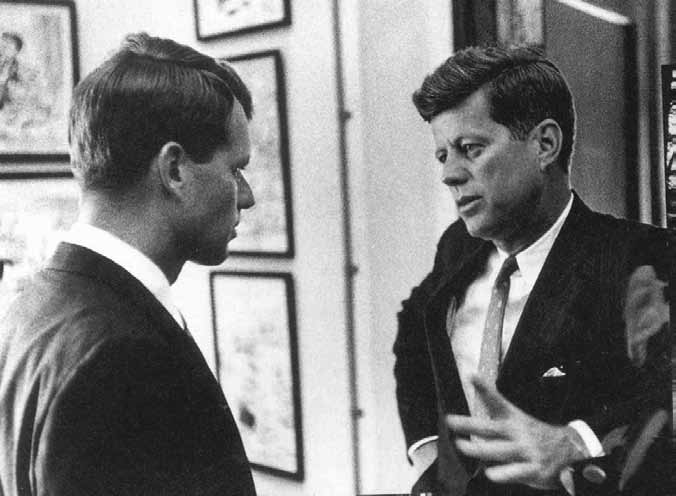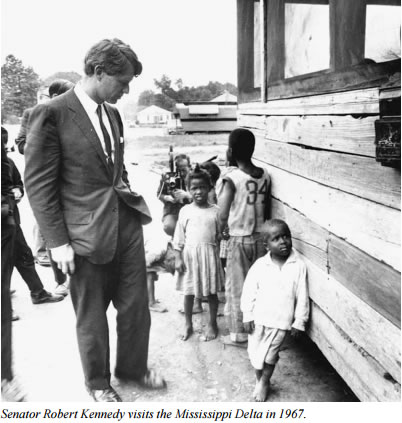This Week in History
May 31-June 6, 2015
Commemorating Robert F. Kennedy On the Anniversary of His Death
By Donald Phau

The Kennedy brothers, Robert (left) and John. |
June 5 marks the 47th anniversary of the assassination of Robert F. Kennedy (1925 – June 1968), the brother of President John F Kennedy and his Attorney General, and a presidential candidate who was on the campaign trail on that fateful day in 1968. Most knowledgeable politicians, as well as the British empire, knew that Bobby Kennedy was in an excellent position to win the Presidency, and that as President, he would pick up the mantle of Franklin Roosevelt, as his late brother did. His foreign policy would include ending the war in Vietnam, and his domestic approach would include revitalizing the economy and defeating the inequality and poverty still rampant in parts of the USA.(1)
This is the context in which to see the assassination of Robert Kennedy, on the evening of his victory in the Democratic Presidential Primary in California(2) in June 1968. Despite the ever present threat of assassination against him, Robert Kennedy knew that as President, he could transform the condition in the country, and raise the living standards of especially the nation’s poor. He traveled and campaigned throughout the country, inspiring millions of people with this message.
At the outset of his campaign when he traveled to rural Mississippi, he went into the fields, and in seeing the squalor in which families lived, he went through a personal transformation. That same day, when he flew home to New York from Mississippi, he told his aides,
“You don’t know what I saw! I have done nothing in my life! Everything I have done is worthless.” He insisted to his own children that they not be blind to the nation’s poor. When he returned home he gathered his nine children, ages two to fifteen and told them:
“In Mississippi, a whole family lives in a shack the size of this room. The children are covered with sores and their tummies stick out because they have no food. Do you know how lucky you are? Do you know how lucky you are? DO something for your country!”
 |
Robert knew that leadership must be fearless, and agapic. On April 4, 1968, on his way to deliver a campaign speech in Indianapolis, he was informed that Martin Luther King had been shot dead earlier that day. He was told not to go, as riots were breaking out in 110 cities; the chief of police feared for his safety if he went into the heart of the African American ghetto, the planned event site. Bobby Kennedy went anyway, his police escort abandoning him as he entered the ghetto neighborhood. He did not campaign there, he showed leadership. There, he delivered a short, emotional speech, one of America’s most memorable, breaking the awful news to a crowd where many had not yet heard of Dr. King’s assassination, including:
“My favorite poem, my -- my favorite poet was Aeschylus. And he once wrote:
Even in our sleep, pain which cannot forget
falls drop by drop upon the heart,
until, in our own despair,
against our will,
comes wisdom
through the awful grace of God.What we need in the United States is not division; what we need in the United States is not hatred; what we need in the United States is not violence and lawlessness, but is love, and wisdom, and compassion toward one another, and a feeling of justice toward those who still suffer within our country, whether they be white or whether they be black.
He ended with
“Let us dedicate ourselves to what the Greeks wrote so many years ago: to tame the savageness of man and to make gentle the life of this world. Let us dedicate ourselves to that, and say a prayer for our country and for our people.”
Indianapolis was one of the few cities where there were no riots.
Footnotes:
(1) A comprehensive article by Don Phau is in the subscription publication EIR Online http://www.larouchepub.com/eiw/private/2015/2015_20-29/2015-22/pdf/13-18_4222.pdf
(2) The fact that the convicted assassin of RFK, Sirhan Sirhan, could not have been the sole killer has been raised continually, through analysis of the number of gunshots fired, the direction from which the fatal shot came, and the like. Most damning was the fact that Sirhan Sirhan stood in front of RFK with his pointed gun, but the Los Angeles coroner, Thomas Noguchi, ruled that the fatal bullet came from behind Kennedy
For the full speech of Robert Kennedy, see http://www.americanrhetoric.com/speeches/rfkonmlkdeath.html
